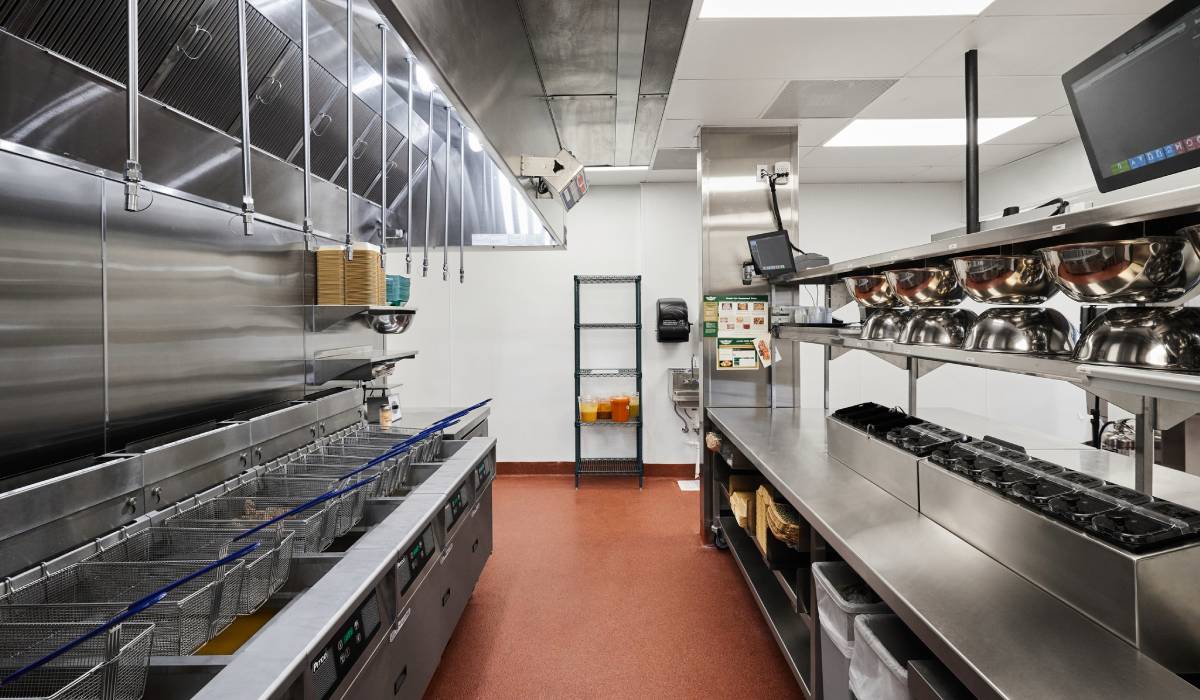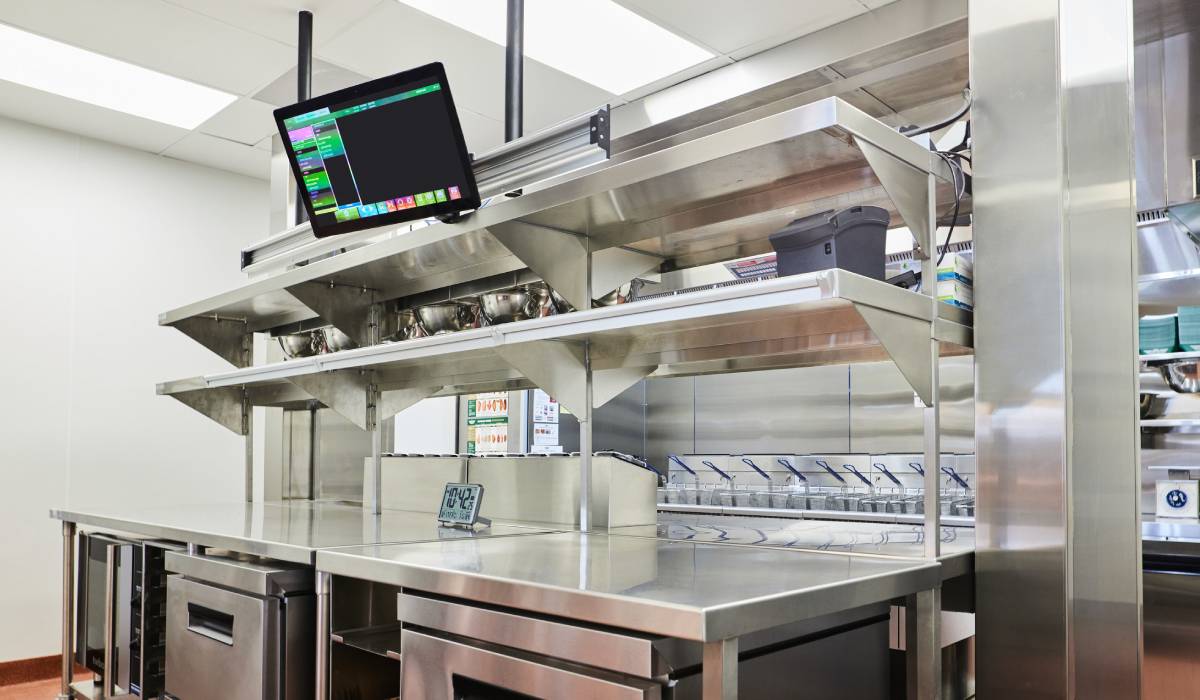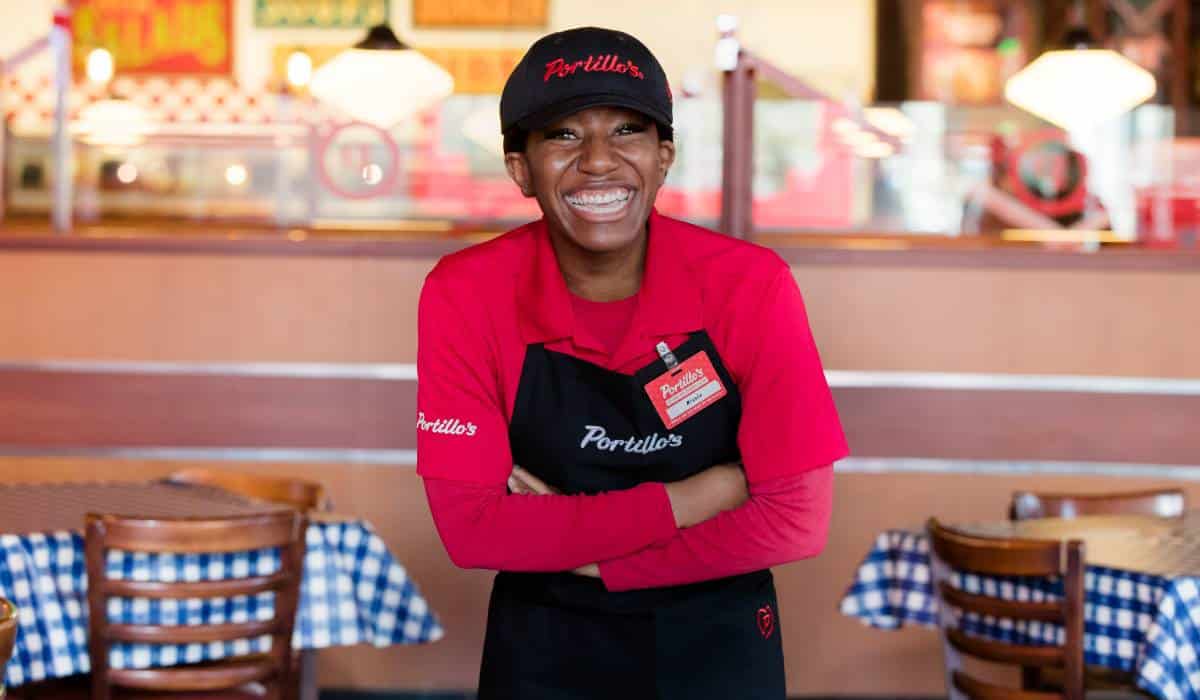When Portillo’s went public last October, it laid a roadmap to 600 locations in front of investors. We’re talking 900 percent growth over the next two-and-half decades for the classic chain, which began in 1964 when Dick Portillo took $1,100 for a first home and used it instead to purchase a 6-by-12-foot trailer.
Portillo’s, when it hit Wall Street, boasted 67 units in nine states (there are now 71). But it had shipped some 2.7 million sandwiches via its direct-to-consumer channel across all 50 states. The No. 1 landing spot? Texas. This offered Portillo’s ammo to circle the Lone Star state, as well as the Sun Belt in general, as a near-term target to bring its hot dogs, Italian beef, and sausages to the masses.
Yet there was an underlying current to all of Portillo’s plans that stretched beyond alluring financials (think average-unit volumes of $7.9 million). Among the brand’s secret-sauce traits, so to speak, was its employee proposition and a culture built through decades of centralized growth. It takes an average of 87 people to run a single store, which is miles clear of industry averages—roughly 23 employees in quick service, per Black Box Intelligence.
And still, in Q1 2022, Portillo’s hourly turnover rate hovered around the low-100 percent range, or 20–30 percentage points better than sector norms. Over the last year, more than 80 percent of Portillo’s managers were internal promotions—an equation that once was flipped.
READ MORE: Check out QSR’s Best Brands to Work For
According to William Blair’s yearly longitudinal analysis of restaurant employee satisfaction, based on more than 350,000 Glassdoor reviews, only Shake Shack and Portillo’s reported sequentially improving scores from elevated 2021 levels when it came to the percentage of workers willing to recommend their job to a friend. Portillo’s surged 47 spots to No. 40 overall.
Like its food and unique service ticks—rhyming employees comes to mind—Portillo’s reputation as an employer of choice has deep, 58-year-old roots in Chicago. Just as people expect legendary chocolate cake that has no business being this good coming out of a fast-food joint, the same is true of workers who sign up. They know Portillo’s is different than the pack.
But now the task becomes spreading that message to fresh markets and new communities, says CEO Michael Osanloo, a former P.F. Chang’s executive who joined the company in August 2018.
Where to begin? “The first war you have to win as Portillo’s when you go to new states, is the war for talent,” he says.
Culture that travels
Thanks to the cyclical nature of the restaurant business and its seasonal, part-time workforce, the labor dynamic has always been a convoluted puzzle. High turnover and shifting demographics pressed operators well before COVID-19. And it’s only become more fractured. The Leisure and Hospitality Sector filled 31,000 jobs in August, a slowdown from 95,000 hires in July and 202,000 in the year-ago period. Restaurants and bars filled 18,200 jobs, per the Bureau of Labor Statistics, meaning the industry was about 600,000 jobs shy of its pre-pandemic levels.
To put it simply, the industry staffed back up quickly over the past year or so but nobody is quite sure where the ceiling is. Will there ever be as many jobs as before?
And so, there’s a quandary, Osanloo says, every concept needs to address if they want to staff in the “new normal.”
“People need to understand why Portillo’s,” he says.
The brand’s marketing function spends roughly 30–40 percent of its time helping HR and recruiting. As Portillo’s prepared to open its first Texas location, at the Grandscape complex in The Colony, it sent its “Beef Bus” mobile unit to “prime the pump,” Osanloo says. This went beyond engaging customers and giving them a preview of what’s to come, however. There were also team members in the branded trailer recruiting.
Portillo’s wasn’t only asking potential workers to sign up for a paycheck, either. “This will sound funny,” Osanloo says, “but one of the most important things to me is I want them to eat our food. I want them, if they don’t know Portillo’s, I want them to fall in love with the food first.”
The chain spends a “considerable” pool of money, time, and effort to introduce itself to the local workforce. When Portillo’s opened in St. Petersburg, Florida, despite having units in Tampa and Brandon, Osanloo recognized the need to drum up awareness. They drove the Beef Bus there as well. Portillo’s hired aggressively and in advance of need. “We trained the heck out of people, and we talked about culture; explained what it means to be a Portillo’s team member and why our values are so important to us.”
The goal was to hire 100–105 employees. Portillo’s ended up with 125.

“But I think, if there’s a secret sauce,” CEO Michael Osanloo says, “it goes back to the culture that we’re trying to create and the values that we’re living. We recruit against those.”
Backing up the value
One of Portillo’s A1 aims is to take wage and compensation off the table. Osanloo says if he can look employees in the eye and know Portillo’s is paying them above-average rates, the brand can get down to what matters.
Indeed, Glassdoor data puts Portillo’s average crew wages (based on reviews) at $12, tied with Raising Cane’s. Only nine fast casuals were higher and one fast-food chain (In-N-Out). For GMs, Portillo’s purported average rate of $81,800 trailed only Shake Shack ($84,000) and Tender Greens ($92,900) on the fast-casual side and sailed every fast-food brand.
Jill Waite, Portillo’s chief human resources officer, doesn’t mention dollar figures until the third point of a three-pronged answer as to why Portillo’s is beating turnover rates during a stretch when some industry peers are approaching 200 percent.
Instead, she starts with a metric that says as much by the fact it’s even being measured as to what it turns up. “One of the things that we’ve learned from our team members is that they like having a best friend at work and someone that they can count on,” Waite says. Seventy percent of employees highlight this, per internal surveys.
Notes Terry Kendrick, an assistant GM in training: “I started off as a knucklehead on the south side of Chicago. Here, I’ve had so many father figures that gave me a chance. They’ve built a bridge to a whole new lifestyle I never thought I could accomplish.”
Before getting into some of the high-level approaches, here’s a view into what Waite and the Portillo’s team have cultivated:
- Flexible scheduling
- Up to $10 in free meals during shifts.
- Paid vacation for full-time employees; a 401(k) plan option with a discretionary company match, and financial support for workers facing hardship through the company’s Heart of Portillo’s fund.
- Opportunities for career growth with personal and professional training and development programs, including an accelerated leadership program for those eager to kickstart their restaurant career.
- Competitive pay at all levels (as mentioned), with a daily pay option, quarterly performance bonuses, annual PTLO stock grants for GMs and market managers, and extra pay for employees on major holidays—what Portillo’s calls “premium holiday pay.” This past holiday season, restaurant support center employees volunteered to help staff restaurants for two-day shifts.
- This is a perk rolled out during the COVID window where employees who work any of the calendar’s five key holidays earn $3 more per hour.
- Career interest days, individual development plans, and soon-to-be-introduced access to LinkedIn Learning.
- Paid parental leave, premier health insurance, flexible spending accounts, life insurance, vision and dental, and a monthly Gympass membership offering holistic wellness programs.
- Referral bonuses, which includes a combination of gift cards and Portillo’s swag. Last year, more than 30 percent of Portillo’s workers stemmed from employee referrals.
- The opportunity for hourly shift leaders to earn performance bonuses, like the rest of management.
- An annual GM summit where store-level leaders hear from corporate on the path forward as well as professional development times. GMs at Portillo’s can make well over $100,000 between base and bonus.
- Portillo’s Ignite Development Program provides all positions, leading up to market manager and general manager, a way to grow their career.
- The “Franks A Lot Fund” where each restaurant receives $250 per month to celebrate employees as they see fit, from meals to rewards as a means to recognition. This came from a survey where GMs suggested Portillo’s beef up its efforts. Some asked for $25 or $50 per month to honor hourly employees. The brand made it $150. They’ve come to life in everything from graduation parties to ice cream celebrations.
After speaking to culture and “bringing lifelong memories to life for both our team members and our guests,” No. 2 on Waite’s whiteboard is crystalizing the career ladder. A famed tactic of Portillo’s is its ability to cross-train. During the first 18 months of COVID, the brand didn’t lay off a single person, despite the fact its business disrupted dramatically, as it did industry-wide.

In the 12-month period that ended June 27, 2021, Portillo’s welcomed 825,000 guests. Drive-thru sales alone were $4.9 million per unit—more than double McDonald’s 2019 figures. Dine-in sales came in at $1.9 million and delivery $850,000. Before COVID, though, Portillo’s raked in $4.4 million within its four walls. “We trained them on how to do other things within the restaurants and that they could grow and that they could be more challenged,” Osanloo says. “But also, more valuable to the company.”
“Ignite,” he adds, speaking to Portillo’s development program, “is not here’s how you make a perfect hot dog, here’s how you make a perfect beef sandwich. It’s all about leadership skills. It’s how do you coach in real time? When do you step in and when do you let somebody figure it out themselves? What’s the best way to staff around your team’s needs but also the business needs? What’s the best way to have a tough conversation with someone?”
These leadership traits, Osanloo says, are something employees keep asking for. “I’ve learned a lot about leadership and maturity,” echoes Zechariah Olson, a GM in training who’s first role was on the beef station six years ago. “I’ve also learned a lot about how to develop a team. When I was younger, I was very hot headed and immature, and I’ve learned a lot from the mentors I’ve had being here.” Employees realize the transferable benefit, regardless if they stick around at Portillo’s or decide to step-stone to another field. “Whatever you do in life, you’re learning leadership skills that will make you better,” Osanloo says. “And that’s because we’re investing in you. We want you to be the best version of yourself.”
This is far from lip service at Portillo’s. As noted, for senior hourly people and management, the brand offers an Ignite program to foster leadership. But the company also provided another set of wage increases at the beginning of July (the company spent $12 million to bump rates and add perks last year). And this latest round was predicated on people “stepping up.”
To explain, say there’s an employee who’s great at making beef sandwiches. After five years, they might see some slowing of wage growth. But if they learn how to make hot dogs, too, or “work the table,” as Portillo’s calls it, the brand will bump their salary because they’ve added another skill set. If they learn how to do inside order taking, Portillo’s will do it again, and so forth.
“We’re tying wage increases to people who can become inherently more productive team members. And that matters because, we’re super busy most of the time,” Osanloo says. “But we still have some shoulder periods where if you’ve got somebody who is trained on both beef and table, you’ve got some staffing flexibility that you might not have had. And so, I love that because we’re paying people more, and we’re continuing to grow their wages, but they’re also learning more skills, learning different stations. Inevitably, and I’m sure you’ve seen this before, as people learn and grow, they enjoy their jobs more. They get more attached to the place.”
It’s a virtuous cycle Portillo’s continues to lean into.
“I’ve never worked for an establishment that’s such a family, such a core base, and there’s so much love and caring between employees, management, upper management, everyone,” says Cody Smith, an assistant GM in training.

Proving its mettle
Most people agree COVID, alongside everything else, did one sure thing for restaurants: it polarized winners and losers. That extends across the spectrum in terms of cleanliness, operations, and, without question, employee care. Waite says Portillo’s had a chance to stand behind company values and show its actions when the chips were down. It provided paid leave, PPE, and created a “Wellness Team” to advise on and monitor the mental health of workers. Additionally, Portillo’s gave 100 percent meal discounts and gift cards throughout the crisis and funded bonuses to field managers. Portillo’s introduced a formal meal plan so employees could take food home to their families. If somebody wanted to step aside for personal reasons, Portillo’s allowed them to take leave, and still paid out benefits and offered gift cards for free meals. It then launched a foundation called “The Heart of Portillo’s Fund” to help workers with setbacks. Through this, the company raised more than $400,000 over 18 months and awarded about 40 grants for close to $100,000.
Coming out of 2020 depths and into the so-called “labor shortage,” is when Portillo’s conducted its “total rewards survey” referenced earlier. It was a straightforward ask: What do you want from the brand in an adjusted world?
The answer unfurled throughout the many benefits Portillo’s created, with a heavy focus on flexibility, development, and recognition. “It showed that we don’t just put our purpose and values on a wall, but we actually live them,” Waite says. “And an additional data point that showed that was we improved our engagement scores, year-over-year, which in a year that Gallup would say was a decline nationwide, worldwide, we actually saw an improvement.”
Why Portillo’s is opening its coffers for employees isn’t tied entirely to recruitment and retention. Waite says if the brand wants to deliver customer service in a way that separates it, especially amid inflation, employees need to like what they do and where they do it. It’s a challenging proposition to ask a stressed out and unhappy worker to be friendly to somebody walking in or pulling up to the drive-thru. That sounds simplistic in nature but the execution is far from it. Portillo’s has been working on ways to create efficiencies in-store so employees can shed menial tasks and concentrate on what makes the brand stand apart.
It gets as granular as catering boxes, which used to require employees to tape them up. A supplier and employee collaborated to develop a new “pop and lock” product where the box snaps in place. “It sounds crazy,” Osanloo says, “but it saves so many hours of labor.” Before, Portillo’s would have somebody spending three to four hours each morning putting them together.
Catering bread started to come in pre-cut, too. It used to be sliced in-house and packaged. Maxwell Street Polish Sausages—the brand’s offering born more than 75 years ago—also used to show up and get hand-trimmed by employees. Ends of the sausage were thrown away. Those arrive pre-cut and trimmed now as well. Portillo’s also moved to red onions machine cut by its supplier and vacuum sealed in bags.
Proof in the pudding
Going back to the idea of fostering soft skills and setting employees up for future success, Portillo’s hosts “core interest” days where team members can raise their hands and ask about their futures. “What we’ve learned through our Ignite program is as people are graduating and they’re promoting the energy in the restaurant, you can feel it,” Waite says. “From our recent engagement survey, it shows that our graduates from our Ignite program have a higher level of engagement that they then bring that back to the restaurant. What happens is when you visit a restaurant and say hey, tell me what’s going on, they’ll say Sarah is working on becoming the next assistant general manager. She’s in the next Ignite wave. It breeds a culture of continuous development and continuous improvement.” This creates a tribe-like culture that appeals to younger generations, Waite adds. The examples of success in-store are visible and apparent peer-to-peer. The notion of having a best friend at work, she says, has continuously shown up on surveys as a reason why people choose Portillo’s, and why they stay.
Osanloo says it’s no accident. Portillo’s recruits for “immutable characteristics.” Are they someone who aspires to being great? Do they treat people at work like extended family? Do they like being in front of other people and having fun?
Portillo’s trains GMs and assistant GMs on “what does a great Portillo’s team member look like,” Waite says. And what kind of behavioral questions can you ask to find that employee.
“We’re not really looking for what’s on the resume, but we’re looking for who that person is and what they will bring to our life our purpose and our values,” she says. “We ask questions through an interview guide and training of how do you create or how have you created lifelong memories for others? Tell us about how do you bring fun to work, or to your soccer team? We employ a lot of first-time jobs. Individuals who this is their first-time job and they may not have a job experience. So tell us how you create fun on your soccer team. We’ll take them back on the line and see how they interact with our team members.”
“… I think that’s one of the key pieces that has allowed us to achieve the retention that we have,” Waite adds. “Because we’re not just looking for someone who can make a great beef sandwich.” The broad view is to hire a team with similar purpose. More than 56 percent of the company’s hourly employees are BIPOC, which is a reflection of something that’s going to factor in as the brand grows as well. Portillo’s hires individuals who reflect communities, so stores that open feel like a local brand customers and workers feel ownership of.
Osanloo says the company understands the challenge ahead, which is why Portillo’s has been unrelenting in its culture-driven approach. Consumers have become more demanding in COVID’s wake. And you could argue it’s tougher to work in a restaurant than ever given the myriad tasks and channels brands are operating through, from curbside to delivery. “There are just other career paths now where the work might be physically demanding but it’s emotionally easier,” he says. “You don’t deal with customers. And while it might be monotonous or boring, it’s easier in some ways. And we have lost people to that.”
“But I think, if there’s a secret sauce,” Osanloo continues, “it goes back to the culture that we’re trying to create and the values that we’re living. We recruit against those.”
“This is an exciting time for Portillo’s,” Waite adds. “Our team members have shown such resiliency during the pandemic. We’re continuing to open new restaurants in Texas, Florida, Arizona, Chicago, and it’s exciting to see the energy and desire to grow. Our team members are growing with Portillo’s, and they’re even bringing on their friends and family.”








